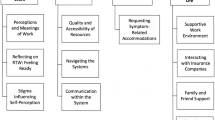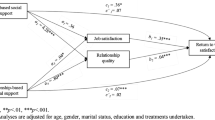Abstract
Purpose Returning to work is a process that is intertwined with the social aspects of one’s life, which can influence the way in which that person manages their return to work and also determines the support available to them. This study aimed to explore cancer patients’ perceptions of the role of their social context in relation to returning to work following treatment. Methods Twenty-three patients who had received a diagnosis of either urological, breast, gynaecological, or bowel cancer participated in semi-structured interviews examining general perceptions of cancer, work values and perceptions of the potential impact of their cancer diagnosis and treatment on work. Interviews were analysed using the iterative process of Framework Analysis. Results Two superordinate themes emerged as influential in the return to work process: Social support as a facilitator of return to work (e.g. co-workers’ support and support outside of the workplace) and Social comparison as an appraisal of readiness to return to work (e.g. comparisons with other cancer patients, colleagues, and employees in other organisations or professions). Conclusions Two functions of the social context of returning to work after cancer were apparent in the participants’ narrative: the importance of social support as a facilitator of returning to work and the utilisation of social comparison information in order to appraise one’s readiness to return to work. The role of social context in returning to work has largely been absent from the research literature to date. The findings of this study suggest that social support and social comparison mechanisms may have a significant impact on an individual’s successful return to the workplace.
Similar content being viewed by others
References
Amir Z, Moran T, Walsh L, Iddenden R, Luker K. Return to paid work after cancer: a British experience. J Cancer Surviv. 2007;1(2):129–136.
Roelen CA, Koopmans PC, de Graaf JH, Balak F, Groothoff JW. Sickness absence and return to work rates in women with breast cancer. Int Arch Occup Environ Health 2009;82:543–546.
Mehnert A, de Boer A, Feuerstein M. Employment challenges for cancer survivors. Cancer 2013;119(Suppl 11):2151–2159.
Taskila T, Lindbohm. ML Factos affecting cancer survivors’ employment and work ability. Acta Oncol. 2007;46(4):446–451.
Feuerstein M, Todd BL, Moskowitz MC, Bruns GL, Stoler MR, Nassif T, Yu X. Work in cancer survivors: a model for practice and research. J Cancer Surviv. 2010;4(4):415–437.
Chow SL, Ting AS, Tin TS. Development of conceptual framework to understand factors with return to work among cancer survivors: a systematic review. Iran J Public Health 2014;43(4):391–405.
Mbengi RK, Mortelmans K, Arbyn M, van Oyen H, Bouland C, de Brouwer C. Barriers and opportunities for return-to-work of cancer survivors: time for action-rapid review and expert consulation. Syst Rev. 2016;5(1):35.
Rydström I, Englund CD, Dellve L, Ahlstorm L. Importance of social capital at the workplace for return to work among women with a history of long-term sick leave: a cohort study. BMC Nurs. 2017;16(1):38.
Islam T, Dahlui M, Majid HA, Nahar AM, Mohd Taib NA, Su TT. Factors associated with return to work of breast cancer survivors: a systematic review. BMC Public Health 2014;14(Suppl 3):S8. doi:10.1186/s12912-017-0234-2.
Tamminga SJ, de Boer AGEM, Verbeek JHAM, Frings-Dresen MHW. Breast cancer survivors’ views of factors that influence the return-to-work process-a qualitative study. Scand J Work Environ Health 2012;38(2):144–154.
Mehnert A, Koch U. Predictors of employment among cancer survivors after medical rehabilitation: a prospective study. Scand J Work Environ Health 2013;39(1):76–87.
Nachreiner NM, Dagher RK, McGovern PM, Baker BA, Alexander BH, Gerberich SG. Successful return to work for cancer survivors. AAOHN J. 2007;55(7):290–295.
Tiedtke C, de Casterle BD, Donceel P, de Rijk A. Workplace support after breast cancer treatment: recognition of vulnerability. Disabil Regabil. 2015;37(19):1770–1776.
Stergiou -K PC, Holness DL, Kirsh B, van Eerd D, Duncan A, Jones J. Am I ready to return to work? Assisting cancer survivors to determine work readiness. J Cancer Surviv. 2016;10(4):699–710.
Amir Z, Brocky J. Cancer survivorship and employment: epidemiology. Occup Med. 2009;59(6):373–377.
Wells M, Williams B, Firnigi D, Lang H, Coyle J, Kroll T, MacGillivray S. Supporting ‘work-related goals’ rather than ‘return to work’ after cancer? A systematic review and meta-synthesis of 25 qualitative studies. Psycho-Oncology 2013;22(6):1208–1219.
Taskila T, Lindbohm ML, Martikainen R, Lehto US, Hakkinen J, Hietanen JP. Cancer survivors received and needed social support from their work place and the occupational health services. Support Care Cancer 2006;14(5):427–435.
Thoits PA. Mechanisms linking social ties and support to physical and mental health. J Health Soc Behav. 2011;52(2):145–161.
Fong AJ, Scarapicchia TM, McDonough MHM, Wrosch C, Sabiston CM. Changes in social support predict emotional well-being in breast cancer survivors. Psychooncology 2017;26(5):664–671.
Woods PL, Schumacher L, Sadhra SS, Sutton AJ, Zarkar A, Rolf P, Grunfeld EA. A guided workbook intervention (WorkPlan) to support work-related goals among cancer survivors: protocol of a feasibility randomized controlled trial. JMIR Res Protoc. 2016;5(2):e75. doi:10.2196/resprot.5300.
Ritchie J, Spencer L. Qualitative data analysis for applied policy research. In: Bryman A, Burgess RG, editors. Analysing qualitative data. London: Routledge; 1993. pp. 173–194.
Glaser BG. The constant comparison method of qualitative analysis. Social Problems 1965;12(4):436–445.
Amir Z, Neary D, Luker K. Cancer survivors’ views of work 3 years post diagnosis: a UK perspective. Eur J Oncol Nurs. 2008;12(3):190–197.
Stergiou -KM, Grigorovich A, Tseung V, Milosevic E, Hebert D, Phan S, Jones J. Qualitative meta-synthesis of survivors’ work experiences and the development of strategies to facilitate return to work. J Cancer Surviv. 2014;8(4):657–670.
Grunfeld EA, Drudge-Coates L, Rixon L, Eaton E, Cooper AF. “The only way I know how to live is to work”: a qualitative study of work following treatment for prostate cancer. Health Psychol. 2013;32(1):75–82.
Love B, Thompson CM, Knapp J. The need to be superman: the psychosocial support challenges of young men affected by cancer. Oncol Nurs Forum. 2014;41(1):21–27.
Rising CJ, Bol N, Burke-Garcia A, Wright K. The ties that bind: the relationship between prostate cancer (PCa) Stigma, Social Support Network Preference, life stage and health outcomes. PscyhoOncology 2016;25(2):52–53.
mcCaughan E, Parahoo K, Prue G. Comparing cancer experiences among people with colorectal cancer: a qualitative study. J Adv Nurs. 2011;67(12):2686–2695.
Sparkes AC, Víctor PS, Brett S. Social comparison processes, narrative mapping and their shaping of the cancer experience: a case study of an elite athlete. Health (London) 2012;16(5):467–488.
Brown D, Ferris DJ, Heller D, Keeping LM. Antecedents and consequences of the frequency of upward and downward social comparisons at work. Organ Beh Hum Decis Process. 2007;102(1):59–75.
Taylor CLC, Kulik J, Badr H, Smith M, Bassen-Engquist K, Penedo F, Gritz ER. A social comparison theory analysis of group composition and efficacy of cancer support group programs. Soc Sci Med. 2007;65(2):262–273.
Aspinwall LG, Taylor SE. Effects of social comparison direction, threat, and self-esteem on affect, self-evaluation, and expected success. J Pers Soc Psychol. 1993;64(5):708–722.
Taylor S, Lobel M. Social comparison activity under threat: downward evaluation and upward contacts. Psychol Rev. 1989;96(4):569–575.
Stanton A, Danoff-Burg S, Cameron C, Snider PR, Kirk SB. Social comparison and adjustment to breast cancer: an experimental examination of upward affiliation and downward evaluation. Health Psychol. 1999;18(2):151–158.
Brakel T. The effects of social comparison information on cancer survivors’ quality of life: a field-experimental intervention approach. Doctor of Philosophy. University of Groningen; 2014. http://www.rug.nl/research/portal/files/12800071/Complete_dissertation.pdf.
Heckhausen J. Developmental regulation in adulthood. New York: Cambridge University Press; 1999.
Belizzi KM, Blank TO, Oakes CE. Social comparison processes in autobiographies of adult cancer survivors. J Health Psychol. 2006;11(5):777–786.
Meltzer LJ, Rourke MT. Oncology summer camp: benefits of social comparison. Child Health Care 2005;34(4):305–314.
Cooper AF, Hankins M, Rixon L, Eaton E, Grunfeld EA. Distinct work-related, clinical and psychological factors predict return to work following treatment in four different cancer types. PsychoOncology 2013;22(3):659–668.
Morrison T, Thomas R. Comparing men and women’s experience following work of work after cancer: a photovoice study. Support Care Cancer 2015;23(10):3015–3023.
Tiedtke C, de Rijk A, Donceel P, Christiaens MR, de Casterlé BD. Survived but feeling vulnerable and insecure: a qualitative study of the mental preparation for RTW after breast cancer treatment. BMC Public Health 2012. doi:10.1186/1471-2458-12-538.
Grunfeld EA, Cooper AF. A longitudinal qualitative study of the experience of working following treatment for gynaecological cancer. Psychooncology 2012;21(1):82–89.
Spelten ER, Verbeek JH, Uitterhoeve AL, Ansink AC, van der Lelie J, de Reijke TM, Kammeijer M, de Haes JC, Sprangers MA. Cancer, fatigue and the return of patients to work-a prospective cohort study. Eur J Cancer 2003;39(11):1562–2156.
Kennedy F, Haslam C, Munir F, Pryce J. Returning to work following cancer: a qualitative exploratory study into the experience of returning to work following cancer. Eur J Cancer Care 2007;16(1):17–25.
Steiner JF, Nowels CT, Main DS. Returning to work after cancer: quantitative studies and prototypical narratives. Psychooncology 2010;19(2):115–124.
Roelen CA, Koopmans PC, Groothoff JW, van der Klink JJ, Bultmann U. Sickness absence and full return to work after cancer: 2-year follow-up of register data for different cancer sites. Psychooncology 2011;20(9), 1001–1006.
Park JH, Park EC, Park JH, Kim SG, Lee SY. Job loss and re-employment of cancer patients in Korean employees: a nationwide retrospective cohort study. J Clin Oncol. 2008;26(8):1302–1309.
Burke NJ, Joseph G, Pasick RJ, Barker J. Theorizing social context: rethinking behavioral theory. Health Educ Behav. 2009;36(5 Suppl):55S–70S. doi:10.1177/1090198109335338.
Hogan BE, Linden W, Najarian B. Social support interventions. Do they work?. Clin Psychol Rev. 2002;22(3), 381–440.
Tjulin Å, MacEachen E, Stiwne EE, Ekberg K. The social interaction of return-to-work explored from co-workers experiences. Disabil Rehabil. 2011;33(21–22):1979–1989.
Bauckham D. A systematic review of the factors affecting the provision of social support form co-workers during the return-to-work process. Brighton J Res Health Sci. 2016;1(2):2. http://blogs.brighton.ac.uk/bjrhs/2016/02/09/a-systematic-review-of-the-factors-affecting-the-provision-of-social-support-from-co-workers-during-the-return-to-work-process/.
Acknowledgements
This paper presents independent research funded by the NIHR under its Research for Patient Benefit (RfPB) Programme (Grant Reference Number PB-PG-0613-31088). The views expressed are those of the author(s) and not necessarily those of the NHS, the NIHR or the Department of Health.
Author information
Authors and Affiliations
Corresponding author
Ethics declarations
Conflict of interest
The authors declare that they have no conflict of interest.
Research Involving Human Participants and/or Animals
All procedures performed in studies involving human participants have been approved by the appropriate research ethics committee (institutional and national) and have been performed in accordance with the ethical standards as laid down in the 1964 Declaration of Helsinki and its later amendments or comparable ethical standards.
Informed Consent
Informed consent was obtained from all patients for being included in the study.
Rights and permissions
About this article
Cite this article
Armaou, M., Schumacher, L. & Grunfeld, E.A. Cancer Survivors’ Social Context in the Return to Work Process: Narrative Accounts of Social Support and Social Comparison Information. J Occup Rehabil 28, 504–512 (2018). https://doi.org/10.1007/s10926-017-9735-9
Published:
Issue Date:
DOI: https://doi.org/10.1007/s10926-017-9735-9




